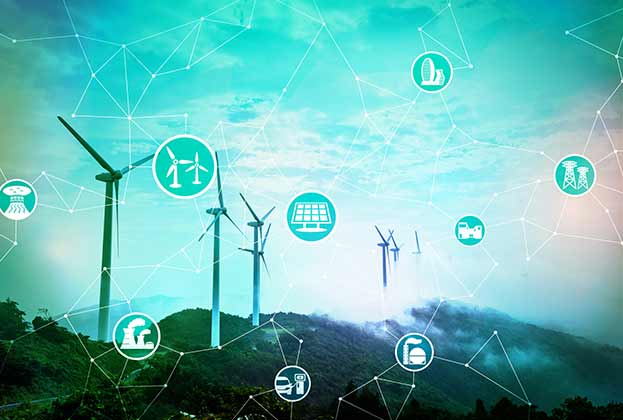The latest report from the UN Inter-governmental Panel on Climate Change (IPCC), while yet again highlighting the urgent need for action, also shone a spotlight on the key role the clean energy sector and technology must play in meeting net zero. The UN looked at existing policies that have been implemented by governments globally, and found that on this existing pathway the world is looking at a temperature rise of 3.2 degrees, which will have catastrophic consequences. The report’s advocation of an accelerated switch to clean energy generation and the use of carbon capture technology can therefore be viewed as a call to motivate businesses and investors to lead on the reduction and removal of CO2 from the atmosphere to help mitigate the situation.
While not a silver bullet, we agree that harnessing the potential of the energy sector is absolutely key in the electrification and renewables agenda, followed by the role of biodiversity and regenerative ecosystems in climate change mitigation. It’s also extremely important for us to recognise that we need to push for fundamental changes in how the property sector currently approaches net zero carbon design and the use of circular principles in how we select and procure building materials. Even things that rely on behavioural changes, such as shifts to more sustainable diets and active travel, can be encouraged through the way we design cities and create places.
According to IEA Net Zero by 2050, A roadmap for the global energy sector, staying on the path to net zero requires the massive deployment of all available clean energy technologies – including renewables, electric vehicles and energy efficient building retrofits – between now and 2030.
For solar power, this is the equivalent to installing the world’s current largest solar park roughly every day. To reach net zero emissions by 2050, annual clean energy investment worldwide needs to more than triple by 2030 to around $4 trillion. This will create millions of new jobs, significantly lift global economic growth, and achieve universal access to electricity and clean cooking worldwide by the end of the decade. The scale of the investment required, however, means that even though more businesses and investors are motivated to deliver projects than ever before, driven by their own assessment of the risks involved and shareholder pressure, they require the support of governments. Fortunately, we are starting to see this happen, but we shouldn’t be complacent.
In Europe, the focus of the recent RePowerEU plan is to provide funding to finance investments and emergency regulation to speed up permitting processes and reduce developer costs. The EU's emergency regulations define wind and solar as projects of overriding public interest and clarify the environmental and grid permit deadlines that approval authorities must meet within two years. The EU Net Zero Industry Act will also fast track permits, increase access to public and private funding, improve workers’ skills and training, and encourage trade deals for key raw materials. The European Commission has earmarked over €250 billion for clean-tech companies and brought forward its target for doubling solar capacity.
In the US, the Inflation Reduction Act 2022 (IRA) is trying to break the country’s dependence on Asian components, re-shore supply chains, and create clean-tech jobs, as well as cutting emissions. Climate and industrial policy are central to the IRA 2022, which is aiming to revamp the US’s infrastructure and create advanced manufacturing jobs. It hopes to do so by strengthening tax incentives for renewable energy and other climate solutions; in total, $369 billion of green tech subsidies have been allocated. This is expected to underpin investment in wind and solar, although to be successful it will require additional permitting and regulatory reforms, as well as grid expansion and modernisation. While being a fairly radical step forward for the country towards net zero, analysts do not expect the US to become totally self-sufficient in terms of renewable energy infrastructure as most raw materials are sourced abroad.
Further information
Contact Eri Mitsostergiou or Marylis Ramos
IPCC report challenges real estate industry to act now to mitigate climate crisis

.jpg)
.jpg)




.jpg)
.jpg)

